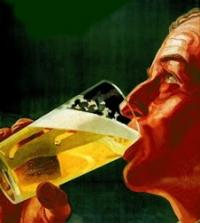
Decoction process - need tips/experiences
#1

Posted 31 March 2009 - 07:47 AM
#2

Posted 31 March 2009 - 08:09 AM
#3

Posted 31 March 2009 - 08:57 AM
#4

Posted 31 March 2009 - 10:09 AM
#5

Posted 31 March 2009 - 11:05 AM
#6

Posted 31 March 2009 - 01:30 PM
#7

Posted 31 March 2009 - 02:35 PM
#8

Posted 31 March 2009 - 03:35 PM
#9

Posted 31 March 2009 - 03:43 PM
#10

Posted 31 March 2009 - 04:50 PM
#11

Posted 31 March 2009 - 05:27 PM
#12

Posted 31 March 2009 - 05:37 PM
One thing that can throw off your results (or, put another way, create artificial differences in results) is that the typical decoction schedule calls for different (higher) saccharification rest temperatures (frequently around 158-160 degrees) than the normal saccharification rest temps of an infusion mash (around 148-152 degrees, give or take). I corrected the saccharification rest temps of my decocted beers so that they were the same as the infused batches, but I am unsure whether others made this correction or not.Thanks for posting the links Ken, and everyone else for the comments and experiences. I agree wholly with the comments about bias in tasting, blind tasting and such. Based on the comments here I think I'll do a full triple decoction including an acid rest as having the correct mash pH seems critical. If the triple decoction doesn't do the trick then I guess nothing will. I like the idea of brewing single-infused and decoction batches and having a blind tasting, maybe I will be able to find some volunteers around the San Diego area
#13

Posted 31 March 2009 - 06:17 PM
One thing that can throw off your results (or, put another way, create artificial differences in results) is that the typical decoction schedule calls for different (higher) saccharification rest temperatures (frequently around 158-160 degrees) than the normal saccharification rest temps of an infusion mash (around 148-152 degrees, give or take). I corrected the saccharification rest temps of my decocted beers so that they were the same as the infused batches, but I am unsure whether others made this correction or not.
#14

Posted 31 March 2009 - 06:19 PM
I noticed that too. Why are the saccharification rests always shown higher (156-160°) on a decoction? On the single-decoction I did, I was only able to get my main mash temp up to 146° after adding the decoction portion back to the mash. I should also say that I made the mistake of making a beer that I was not familiar with... I should have made my normal Oktoberfest Lager so I could compare it.One thing that can throw off your results (or, put another way, create artificial differences in results) is that the typical decoction schedule calls for different (higher) saccharification rest temperatures (frequently around 158-160 degrees) than the normal saccharification rest temps of an infusion mash (around 148-152 degrees, give or take). I corrected the saccharification rest temps of my decocted beers so that they were the same as the infused batches, but I am unsure whether others made this correction or not.
#15

Posted 31 March 2009 - 07:06 PM
#16

Posted 01 April 2009 - 10:17 AM
#17

Posted 01 April 2009 - 11:49 AM
#18

Posted 01 April 2009 - 12:08 PM
Now that's an interesting observation - that it could have originally been a way to get consistent results without a thermometer.Anyone do a largeish sample size with two side-by-side batches? Maybe with a homebrew club?Decoction had a couple of historic uses. I helps when the malt has an inconsistent level of modification (not really a big deal these days unless you are home malting) and you could brew w/o a thermometer and achieve a decent level of accuracy. The idea was that you could detect something that was around your own body temperature, and by pulling measurable amounts and heating to a known temp (boiling) you could raise the temp of the main part of the mash predictably.
#19

Posted 01 April 2009 - 12:08 PM
That's pretty much what my experiment was about, except that it involved brewers from around the world.I thik it would be interesting for a homebrew club to get maybe 10 - 20 people to all brew the same recipe. Some would do a decoction and some wouldn't. Then, have a gathering to taste and rank the beers. Nobody would know which ones were done with a decoction and which ones weren't until the end. Then, see if the rankings show a clear preference for one type or another.
#20

Posted 01 April 2009 - 12:28 PM
I guess I should have clicked on your link first. I'm reading the results now -- Good Stuff!!That's pretty much what my experiment was about, except that it involved brewers from around the world.
1 user(s) are reading this topic
0 members, 1 guests, 0 anonymous users












